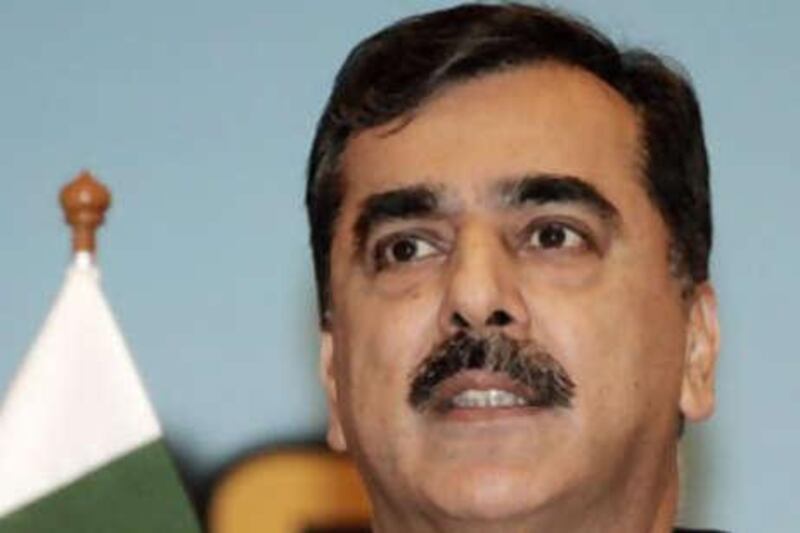ISLAMABAD // Pakistan's prime minister left for Washington today, needing to convince George W Bush that he is serious about combating Islamic militancy and seeking help from the United States to shore up the economy. Yousaf Raza Gilani is due to hold talks with the US president on Monday and while Islamabad's efforts to tackle Taliban and al Qa'eda extremists are likely to dominate the discussion, the crumbling economy is also proving to be a linked issue. Fears the US might launch an unilateral offensive in Pakistan's troubled tribal region bordering Afghanistan have added to mounting instability in the nuclear-armed country, exacerbating dissatisfaction over soaring prices and acute energy shortages. "It is in Pakistan's interest to curb extremism and terrorism - I lost my own leader because of terrorism," Mr Gilani said as he left Islamabad, referring to Benazir Bhutto, the former prime minister who was assassinated in December. "We have a lot of co-operation with the United States and we want to further enhance co-operation between the two countries," said Mr Gilani, who is due to arrive in Washington today after an overnight stop in Britain. The trip has "great significance for Pakistan", said Mohammed Sadiq, a spokesman for the Pakistani foreign ministry. "Pakistan is a key US ally and this is the first visit by a democratically elected prime minister for nine years," Mr Sadiq said. "Talks will cover bilateral relations, war on terrorism. The economy will be a major part." Mr Gilani's government took power after defeating political allies of Pervez Musharraf, the president, who enjoys the support of the US, in general elections in February, and caused immediate concerns in Washington by launching talks with Pakistan's Taliban.
Mr Bush said on July 15 he was worried by cross-border militant attacks and would discuss the matter with Mr Gilani. US troop deaths in Afghanistan have exceeded those in Iraq in the past two months. "We will continue to keep the pressure on al Qa'eda with our Pakistan friends," Mr Bush was quoted as saying by Reuters last week. "I certainly hope that the government understands the dangers of extremists moving in their country. I think they do," he said. Condoleezza Rice, the US secretary of state, said during a visit to Australia on Friday that Pakistan "does need to do more" to control militant activity in its border areas. "Gilani will say that the war on terror is our own war, but this will not appease the Americans. They want something done by Pakistan in concrete," said Hasan Askari Rizvi, a security and political analyst.
Nevertheless, the White House indicated last week it was standing by Islamabad when it announced that it plans to shift US$230 million (Dh842m) in counter-terrorism aid to upgrade Islamabad's ageing F-16 fighter jets. Some Democratic congressman have criticised the shift of money as a diversion from the terrorism fight. Analysts said that for all its reservations, the US could not afford to alienate Islamabad's new government. "The US gave Musharraf eight and a half years of patience, so shouldn't it at least give more than a few months for an elected, democratic government?" said Samina Ahmed of the International Crisis Group, a think tank. Ms Ahmed added that Mr Gilani also needs to look beyond Mr Bush's administration, whose term ends in January, and speak to sympathetic, elected ears in the US congress. One way of showing its patience would be for the US to further boost economic aid and help Mr Gilani deal with growing public anger at the price of basic items, she said. Congress has proposed tripling non-military aid to Pakistan to $7.5 billion over five years, but linking security aid to counter-terrorism performance.
"Following years of unqualified support for President Musharraf, support for the new government will send an important signal to the people of Pakistan," said Lisa Curtis, a South Asian policy expert and a former adviser to the US state department. "It will show that the United States is giving this democratic government a chance - it will be important in symbolic terms," Ms Curtis said. Many Pakistanis have been angered by the way the US for many years put all its weight behind Mr Musharraf, who seized power in a military coup in 1999 and joined the US-led "war on terrorism" in 2001. He stepped down as army chief last November.
"If the US shows it supports a democratic leader and not a military one, it will be a welcome change and will probably make the relation more enduring," said Talat Masood, a Pakistani analyst. Mr Masood, a former army general, said a key part of Mr Gilani's visit would involve looking for financial assistance. But the major part would involve convincing Mr Bush he was serious in opposing militancy. "Mr Gilani is going to say that we are the worst affected in the 'war on terror' and that Pakistan's partners will have to show patience to let the new government strategy succeed," Mr Masood said. "And most important, he will tell them that the government would really be undermined by a US incursion into Fata," the Federally Administered Tribal Areas, he said. The government has been able to contain public anger over a number of US missile strikes on al Qa'eda and Taliban targets in the tribal areas, but the deaths of 11 Pakistani troops in one such raid in June sparked widespread outrage.
* The National





